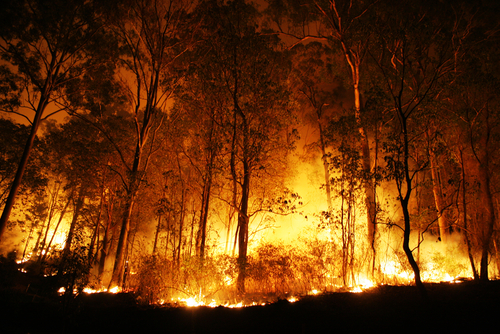
The greatest natural treasure on planet Earth is burning.
Brazil’s National Institute of Space Research has reported 74,000 fires in the Amazon so far this year, a huge increase over 2018. The smoke is so thick and so widespread, it caused darkness at midday in the city of São Paulo, more than 1,500 miles away.
Unlike chaparral and other arid ecosystems that are adapted to fire, burning isn’t a part of the natural lifecycle of a rainforest. Wildfires occasionally happen during the dry season, but these fires aren’t natural. They’re the fault of farmers and cattle ranchers using slash-and-burn tactics to clear the land.
And much of the blame for this can be laid at the feet of one man. As my Patheos colleague Michael Stone reports, Brazil’s recently elected president Jair Bolsonaro is a right-wing Christian fascist who boasts of his homophobia and misogyny. He’s promised to govern as a theocrat giving special privileges to Christianity, and he’s made no secret of his desire to exterminate Brazil’s indigenous people, unbelievably saying: “It’s a shame that the Brazilian cavalry wasn’t as efficient as the Americans, who exterminated the Indians” (source).
Bolsonaro views the Amazon as nothing but virgin resources to be plundered for profit. Since he took office, he’s been weakening checks on illegal logging and burning. He told people to call him “Captain Chainsaw” and fired the head of the Brazilian government agency monitoring deforestation. In an especially absurd and contemptible lie, he even blamed environmental groups, claiming that they set the fires to make him look bad (shades of Ayn Rand blaming sweatshop fires on nosy investigative journalists!).
Although the fires aren’t directly caused by climate change, climate change makes a bad situation worse. Warmer, drier weather means that when fires start, they grow bigger and burn longer than they otherwise would have. And in a vicious circle, the stored carbon released from the burning contributes to further climate change and warms the planet still more.
Because most of the nutrients in a rainforest cycle through the trees, the soil tends to be thin. When land is cleared for agriculture or cattle grazing, its fertility is easily depleted, preventing the forest from regenerating. The Amazon could be especially susceptible to this, because it’s so large that it creates its own clouds via transpiration, helping to sustain the wet weather patterns a rainforest depends on. Even though the fires don’t directly threaten the majority of the Amazon, there may be a tipping point where if enough forest is cleared, this effect will cease and the rest will revert to grassland.
After massive demonstrations in Brazil and a chorus of international criticism, Bolsonaro reversed course and promised to send in the army to help fight the fires. But it’s clear that whatever cooperation he offers will be grudging at best. Given how little margin of error we have left in the fight to keep climate change from becoming catastrophic, that’s a discouraging thought.